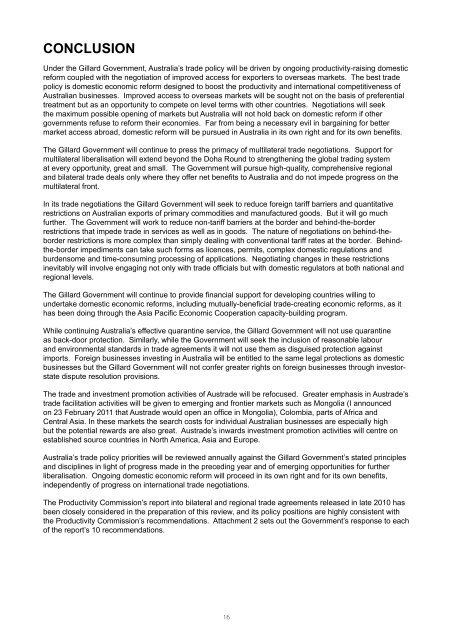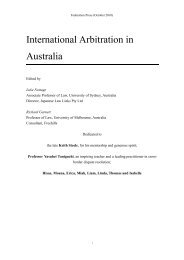Gillard Government Trade Policy Statement - Australian Industry Group
Gillard Government Trade Policy Statement - Australian Industry Group
Gillard Government Trade Policy Statement - Australian Industry Group
You also want an ePaper? Increase the reach of your titles
YUMPU automatically turns print PDFs into web optimized ePapers that Google loves.
CONCLUSIONUnder the <strong>Gillard</strong> <strong>Government</strong>, Australia’s trade policy will be driven by ongoing productivity-raising domesticreform coupled with the negotiation of improved access for exporters to overseas markets. The best tradepolicy is domestic economic reform designed to boost the productivity and international competitiveness of<strong>Australian</strong> businesses. Improved access to overseas markets will be sought not on the basis of preferentialtreatment but as an opportunity to compete on level terms with other countries. Negotiations will seekthe maximum possible opening of markets but Australia will not hold back on domestic reform if othergovernments refuse to reform their economies. Far from being a necessary evil in bargaining for bettermarket access abroad, domestic reform will be pursued in Australia in its own right and for its own benefits.The <strong>Gillard</strong> <strong>Government</strong> will continue to press the primacy of multilateral trade negotiations. Support formultilateral liberalisation will extend beyond the Doha Round to strengthening the global trading systemat every opportunity, great and small. The <strong>Government</strong> will pursue high-quality, comprehensive regionaland bilateral trade deals only where they offer net benefits to Australia and do not impede progress on themultilateral front.In its trade negotiations the <strong>Gillard</strong> <strong>Government</strong> will seek to reduce foreign tariff barriers and quantitativerestrictions on <strong>Australian</strong> exports of primary commodities and manufactured goods. But it will go muchfurther. The <strong>Government</strong> will work to reduce non-tariff barriers at the border and behind-the-borderrestrictions that impede trade in services as well as in goods. The nature of negotiations on behind-theborderrestrictions is more complex than simply dealing with conventional tariff rates at the border. Behindthe-borderimpediments can take such forms as licences, permits, complex domestic regulations andburdensome and time-consuming processing of applications. Negotiating changes in these restrictionsinevitably will involve engaging not only with trade officials but with domestic regulators at both national andregional levels.The <strong>Gillard</strong> <strong>Government</strong> will continue to provide financial support for developing countries willing toundertake domestic economic reforms, including mutually-beneficial trade-creating economic reforms, as ithas been doing through the Asia Pacific Economic Cooperation capacity-building program.While continuing Australia’s effective quarantine service, the <strong>Gillard</strong> <strong>Government</strong> will not use quarantineas back-door protection. Similarly, while the <strong>Government</strong> will seek the inclusion of reasonable labourand environmental standards in trade agreements it will not use them as disguised protection againstimports. Foreign businesses investing in Australia will be entitled to the same legal protections as domesticbusinesses but the <strong>Gillard</strong> <strong>Government</strong> will not confer greater rights on foreign businesses through investorstatedispute resolution provisions.The trade and investment promotion activities of Austrade will be refocused. Greater emphasis in Austrade’strade facilitation activities will be given to emerging and frontier markets such as Mongolia (I announcedon 23 February 2011 that Austrade would open an office in Mongolia), Colombia, parts of Africa andCentral Asia. In these markets the search costs for individual <strong>Australian</strong> businesses are especially highbut the potential rewards are also great. Austrade’s inwards investment promotion activities will centre onestablished source countries in North America, Asia and Europe.Australia’s trade policy priorities will be reviewed annually against the <strong>Gillard</strong> <strong>Government</strong>’s stated principlesand disciplines in light of progress made in the preceding year and of emerging opportunities for furtherliberalisation. Ongoing domestic economic reform will proceed in its own right and for its own benefits,independently of progress on international trade negotiations.The Productivity Commission’s report into bilateral and regional trade agreements released in late 2010 hasbeen closely considered in the preparation of this review, and its policy positions are highly consistent withthe Productivity Commission’s recommendations. Attachment 2 sets out the <strong>Government</strong>’s response to eachof the report’s 10 recommendations.16



